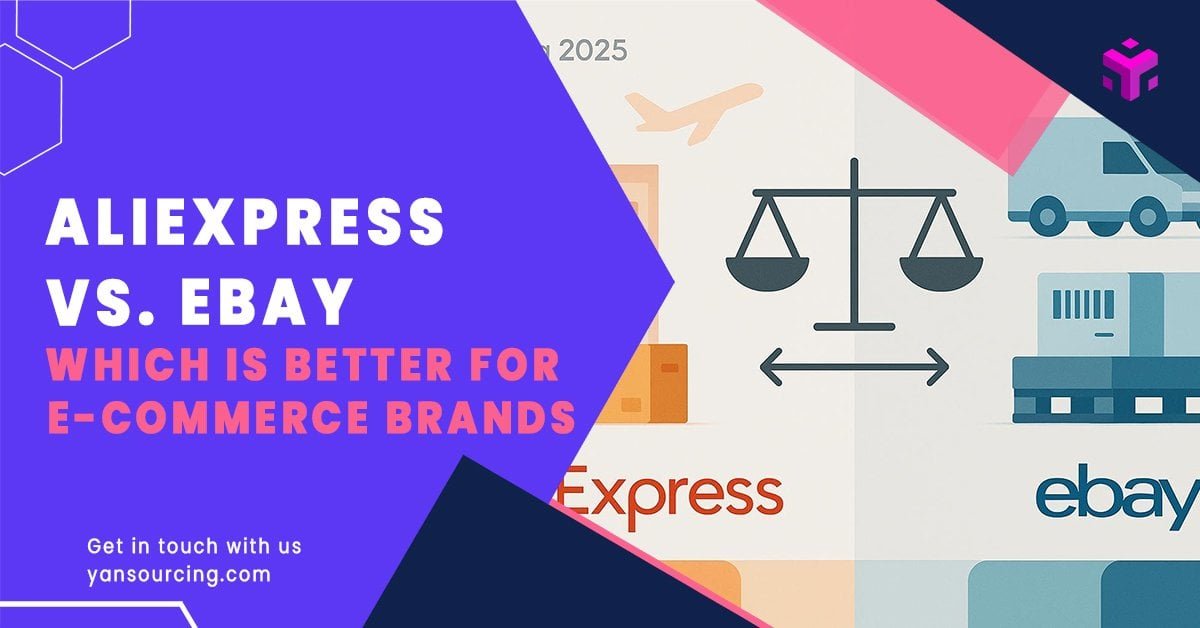
If you’re running a growing e‑commerce brand in 2025, chances are you’ve used consumer marketplaces to test products or bridge stockouts.
But as you move toward private label and tighter supply control, should you source from AliExpress or eBay—and in which scenarios does each make sense?
This guide compares them specifically as sourcing channels (for test inventory and dropshipping), not as sales channels, with evidence-linked policies and practical recommendations.
As of Oct 2025, policies and logistics programs on both platforms continue to evolve. Where we cite program terms (buyer protection, shipping, tariffs), we include official documentation and note timing.
At‑a‑glance: how they differ for sourcing
| Dimension | AliExpress | eBay |
|---|---|---|
| Supplier & MOQ dynamics | Vast SKU breadth, very low MOQs; many sellers are trading companies. Good for test orders and micro-batches. | Heterogeneous mix (resellers, liquidators, some business sellers). Low MOQs possible, but continuity and wholesale readiness vary widely. |
| Lead time & logistics | Standard cross‑border shipping can be 15–45 days; “Choice” SKUs offer faster, more deterministic delivery in select regions (as marketed by AliExpress/Alizila). | Domestic purchases can arrive in ~2–7 days; international depends on route and program (EIS) used. |
| Buyer protection & returns | Buyer Protection covers not received/not as described; “Free Returns” is listing- and region-dependent with specific limits. | Money Back Guarantee covers not received/not as described; windows are typically around 30 days (locale-dependent). |
| Authenticity/IP risk | Marketplace trading environment; DSA oversight in EU but no category‑wide pre‑authentication. | Category‑specific Authenticity Guarantee adds assurance on select goods; VeRO/IP enforcement framework in place. |
| Dropship tooling | AliExpress Dropshipping Center endpoint exists; broad third‑party ecosystem. | No official buyer‑facing dropship tools; third‑party arbitrage tooling exists but is not endorsed. |
| Scalability to private label/OEM | Limited; often not factory‑direct. Better as a testing ground before moving to factory sourcing. | Limited; primarily resale/overstock and liquidation, not OEM/ODM. |
| QC/inspection feasibility | Upstream QC is not integrated; inspections must be arranged independently. | Same—no built‑in buyer inspection workflow. |
| Landed cost exposure | Cross‑border imports often incur duties/VAT; listing may show taxes in some regions. | Domestic buys avoid import duties; international purchases often show import charges at checkout under eBay International Shipping. |
Note: Details vary by country and listing type. Always confirm the specific listing’s terms at checkout.
AliExpress as a sourcing channel (2025)

AliExpress can be effective for rapid product testing and low‑commitment orders, with strong SKU breadth and automation tooling support via its dropshipping ecosystem. However, lead times and return policies depend heavily on listing type and destination.
Buyer protection and returns (as of Oct 2025)
- AliExpress outlines refund protection for items not received or not as described and explains dispute steps in its official program overview; see the concise policy on the platform’s Buyer Protection page: AliExpress Buyer Protection.
- “Free Returns” is not blanket sitewide. Terms are listing‑ and region‑dependent (e.g., 90‑day window from order date for sellers in Mainland China; 15 days from receipt for EU sellers), with size/weight and participation limits; see the official terms PDF: AliExpress Free Returns service agreement (2024–2025 terms).
Lead time and logistics (as of Oct 2025)
- Standard cross‑border shipments can be slow and variable. “AliExpress Choice” promotes faster, more predictable delivery on eligible SKUs in select markets, alongside free‑shipping thresholds and free returns in certain countries. For a corporate overview of promises and scope, see the Alizila explainer: What is AliExpress Choice.
Dropshipping and automation
- The AliExpress Dropshipping Center endpoint exists and is widely used by operators to research and place orders; access requires an AliExpress account: AliExpress Dropshipping Center.
Where AliExpress fits best
- Rapid product testing with very low MOQs
- Dropshipping trials where you can target “Choice” listings for faster delivery in supported regions
- Short learning cycles before stepping up to factory sourcing when a product validates
Constraints to plan for
- Listing‑dependent return eligibility and windows
- Variable quality/consistency since many sellers are trading companies
- Cross‑border duty/VAT exposure depending on destination and shipment terms
eBay as a sourcing channel (2025)
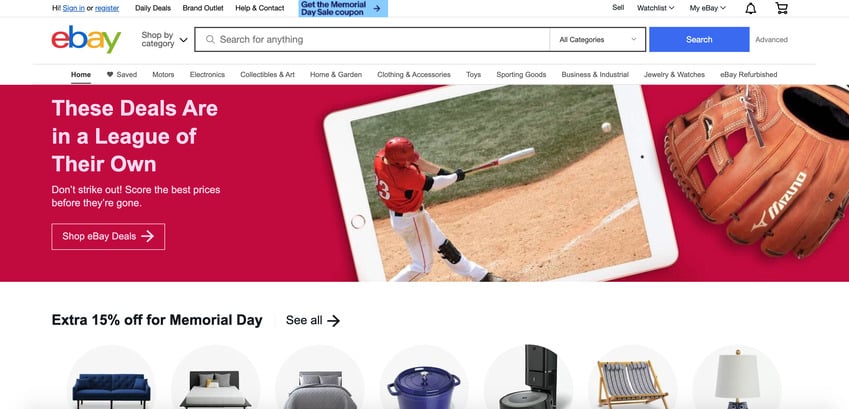
eBay’s value for sourcing is strongest when you’re buying domestically from business sellers, liquidation lots, or overstock—often enabling faster replenishment to bridge stockouts.
Protections are robust for not received/not as described, and category‑specific authenticity checks add confidence in select categories.
Buyer protection and returns (as of Oct 2025)
- eBay’s Money Back Guarantee covers most transactions where items are not received or not as described, with claim windows that are typically around 30 days but can vary by locale and case. See the official program summary: eBay Money Back Guarantee policy.
Lead time, import charges, and tariffs (as of Oct 2025)
- Domestic sourcing can often deliver in 2–7 days depending on seller service levels. For international purchases, eBay’s program may display and sometimes collect import charges at checkout—see the buyer terms: eBay International Shipping (buyer terms).
- For U.S. buyers, note eBay’s update that the de minimis exemption was removed effective Aug 29, 2025, meaning imports are generally subject to duties regardless of value—see: eBay U.S. tariff updates (2025).
Authenticity and IP enforcement (as of Oct 2025)
- In several categories (sneakers, handbags, watches, jewelry, trading cards, and region‑specific expansions), eligible items are physically authenticated before delivery. See the buyer program details: eBay Authenticity Guarantee (buyers).
Where eBay fits best
- Domestic stop‑gap replenishment to bridge stockouts
- Bulk lots or liquidation opportunities from business sellers in your own country
- Sourcing in categories covered by authenticity checks (where applicable)
Constraints to plan for
- Supplier continuity can be inconsistent; many sellers are resellers rather than manufacturers
- International buys still face duties/VAT; lead times vary by route and seller
- Limited path to private label/OEM and minimal buyer‑side automation
Scenario‑based recommendations (2025)
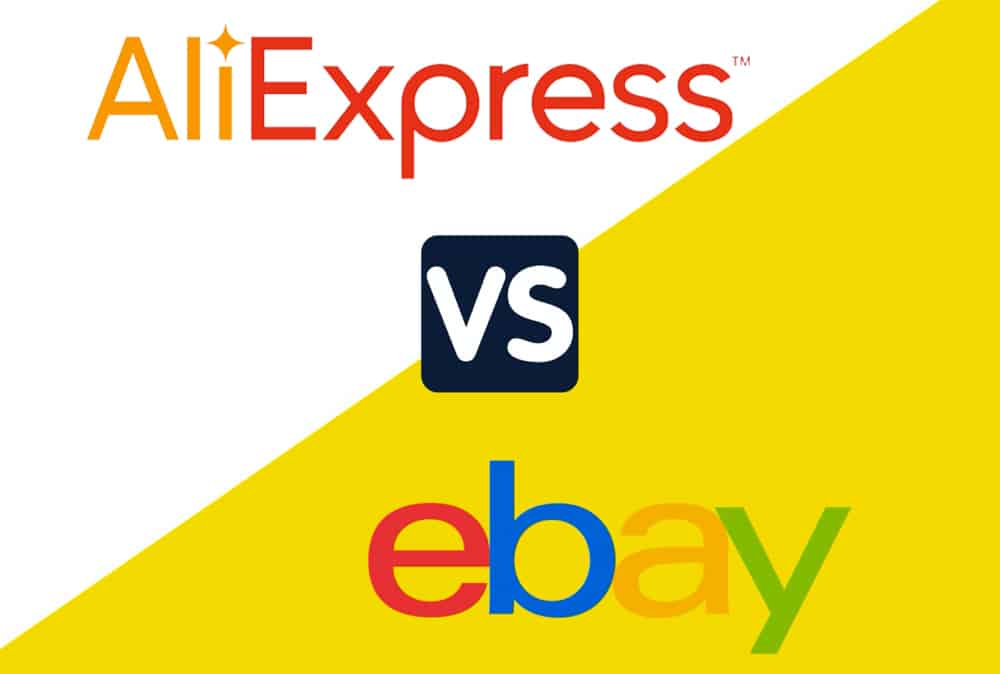
Best for rapid product testing and dropshipping trials
- AliExpress. The combination of very low MOQs, broad SKU coverage, and a functioning dropship ecosystem is hard to beat for the test phase. Favor “Choice” listings in supported markets for faster delivery and simpler returns.
Best for domestic, stop‑gap replenishment
- eBay. When a hero SKU stockout threatens revenue, domestic eBay purchases from business sellers or liquidation lots can land quickly, with Money Back Guarantee coverage if items are not received or not as described.
Best stepping‑stone to private label/OEM
- Neither platform at scale. Once a product validates, most brands migrate to factory sourcing to standardize quality, customize branding/packaging, and lock in sustainable margins. Use AliExpress/eBay as learning or emergency channels—not as permanent core supply.
How to choose for your brand: a quick rubric
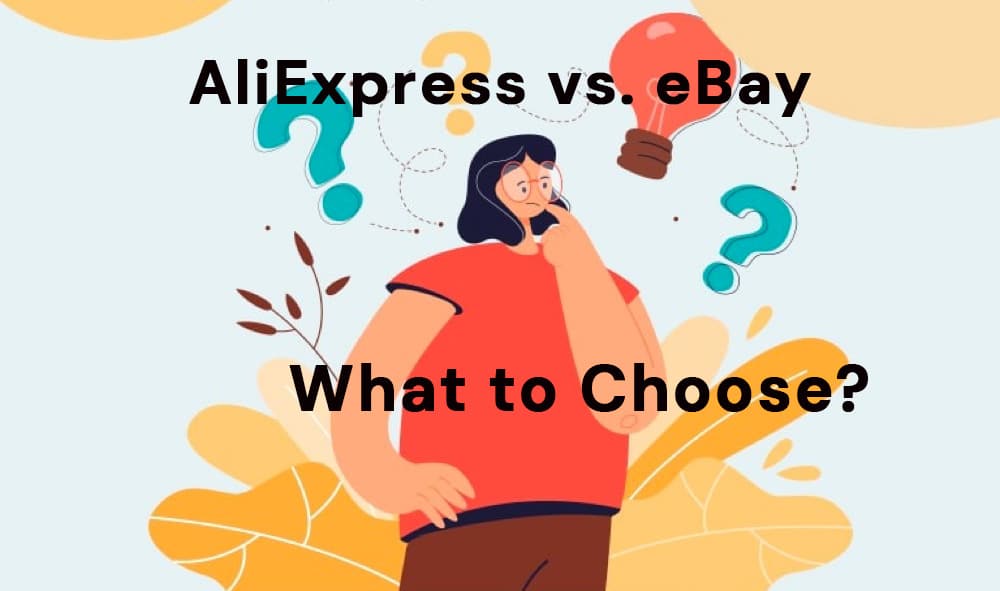
Ask these questions before you commit to a channel for a given SKU:
- What lead time do you truly need?
- If you need delivery within 2–7 days domestically, eBay (domestic sellers) often wins.
- If you can tolerate longer cycles while testing, AliExpress (especially Choice listings where available) can work.
- What’s your duty/tax exposure and landed cost?
- Domestic eBay buys avoid import duties; international eBay purchases may show import charges at checkout under International Shipping.
- AliExpress cross‑border shipments may incur duties/VAT depending on your country and the listing’s terms.
- How critical is continuity and MOQ flexibility?
- For one‑off tests and micro‑batches, AliExpress is built for low MOQs.
- For bridging a stockout domestically, eBay can deliver faster—but continuity depends on the business seller’s inventory.
- Do you need authenticity assurance?
- eBay’s category‑specific Authenticity Guarantee adds an extra layer of protection in eligible categories.
- Are you heading to private label soon?
- If customization and spec control are imminent needs, plan to transition to factory sourcing sooner rather than later.
Total cost of ownership checklist (don’t skip these)
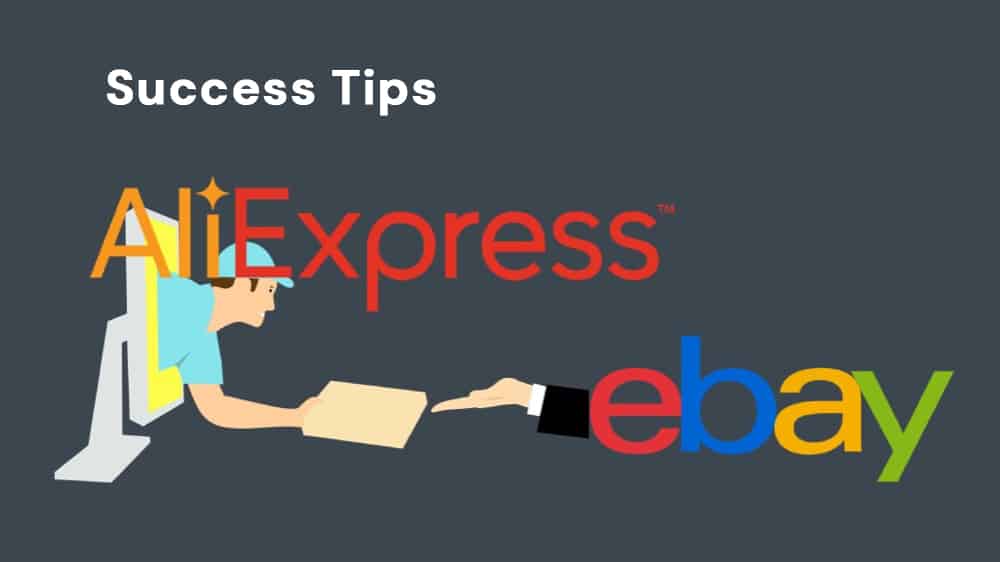
Use this checklist to avoid surprises in your margin math:
- Import duties, VAT/GST, and brokerage/handling (cross‑border)
- Platform dispute windows and return shipping rules (who pays, where to return)
- Shipping class and delivery promise (standard vs “Choice”; domestic vs international)
- Defect/return rate assumptions (and the operational cost of replacements)
- Payment risk and cash timing (escrow release; chargeback exposure)
- Tooling/automation subscriptions (if any) and staff time for order ops
- Packaging/compliance needs (labels, warnings, testing) if you intend to sell in regulated categories
Also consider: a controlled path to private label
If your tests succeed and you’re ready to standardize quality, packaging, and logistics, a sourcing partner can help you move from marketplace buys to direct factory supply.
- Yansourcing — China‑based sourcing agent offering supplier vetting, production management, QC/inspection, private label customization, and end‑to‑end logistics coordination.
FAQs (2025)
1. Is AliExpress suitable for dropshipping in 2025?
For early‑stage tests, yes—especially using “Choice” listings in supported markets for faster shipping and simpler returns. Protections are outlined on the official AliExpress Buyer Protection page, and “Free Returns” depends on the listing and region per the official terms PDF.
2. Does eBay show import charges upfront for international purchases?
Often, yes—under its International Shipping program, some import charges may be displayed and collected at checkout. See the buyer terms: eBay International Shipping (buyer terms).
3. What changed for U.S. import duties in 2025?
eBay notes the removal of the de minimis exemption effective Aug 29, 2025, meaning imports are generally subject to duties regardless of value. Details: eBay U.S. tariff updates (2025). Always confirm current rules with a customs broker for your HS codes.
4. How do dispute windows compare?
AliExpress provides Buyer Protection with defined steps and periods; eBay’s Money Back Guarantee typically allows around 30 days to file claims for not received or not as described (locale‑dependent). See eBay Money Back Guarantee policy.
5. Which is better for authenticity assurance?
eBay offers a category‑specific Authenticity Guarantee for selected items that undergo expert inspection before delivery. AliExpress does not provide a comparable, broad pre‑authentication program.
The bottom line for 2025
- Use AliExpress to explore and validate ideas with minimal commitment—then, once a SKU proves itself, plan your migration to a direct, factory‑controlled supply chain.
- Use eBay for fast, domestic stop‑gap replenishment or opportunistic bulk buys from business sellers, especially when delivery speed is the priority and authenticity checks apply.
- For repeatable quality, custom branding, and predictable margins, graduate to factory sourcing and structured QC as soon as your data supports it.
